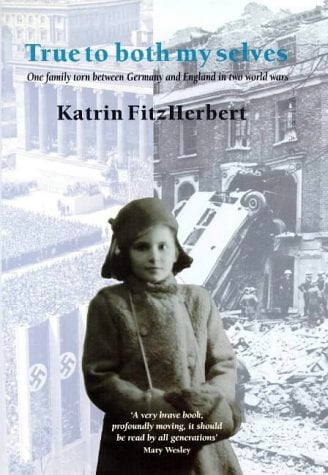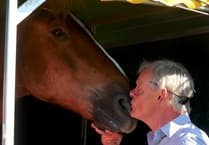An award winning memoir penned by Dartington author, Katrin FitzHerbert, is being republished 34 years after it first hit the shelves.
Katrin won the PEN Ackerley Prize for autobiography in 1988 for ‘True to Both My Selves’ which tells the story of three generations of women and their struggle for survival and integrity in times divided by war.
At the time Katrin was delighted to receive the prize, which has also been awarded to fellow illustrious authors Alan Bennett, Anthony Burgess, Germaine Greer, John Osborne, Julian Barnes, Margaret Forster and Blake Morrison.
She said: “It received glowing reviews in all the posh papers and several people named it their book of the year, to my utter astonishment.”
Now Katrin, of Dawn Rest Home, is delighted her autobiography - an extraordinary account of a childhood disjointed by country and by war – is being republished.
Born in Germany in 1936, Katrin lived under Hitler's regime before being suddenly repatriated at the age of 11 to an England she had never known. There she had to forget her Nazi German father and the German language.
Her early life mirrored that of both her mother and grandmother, who married her German expatriate grandfather in London in 1905.
Their fate was decided by an ugly and little-known chapter in British history, the ill-treatment of the quiet, law-abiding German minority in Britain during the First World War.
Expelled by the British Government in 1919 and with their eight-year-old daughter Elfreda in tow, the couple left to make a new life in a small German town near Berlin.
By 1931 Elfreda had fallen in love and married the German man who, in 1936, would become Katrin’s father; a committed member of the Nazi Party employed in the Hitler Youth administration, which she idolized.
In ‘True to Both My Selves’ Katrin gives a fascinating inside account of what it was like growing up in a National Socialist state; retracing the emotions of her young self as she becomes an enthusiastic member of the Nazi equivalent of the Brownies and writes letters to Hitler on his birthday.
She conveys vividly the dangerous seductions of national socialism and a charismatic leader; the sense of duty, obedience and self-sacrifice to a greater cause, all of which she saw embodied in her adored father.
Reflecting on the past, Katrin said: “I just had to become somebody else overnight. Because of what my grandma had been through she said to me and my brother ‘Don’t tell anybody you have ever been to Germany’.
“We had to completely wipe that part of our lives out of our heads. My brother always did but I, being the sassy one, eventually decided it was ridiculous, I am just going to be me.
“I was very secretive about my life until I was at university. At a tea party the discussion turned to the war. Somebody had been sent to Canada so they wouldn’t get bombed and I said ‘Actually I spent the war in Germany’.
“There was a deadly hush. The first reaction was ‘I didn’t know you were Jewish’ and the next reaction was ‘It must have been awful in the camps’.
“And I said ‘I wasn’t in a camp and I’m not Jewish, my father was in the Wehrmacht.’ That brought that party to an end and I realised you can’t do that because it was so shocking what I had said to them.”
With great courage and honesty Katrin describes in her memoir how, when she returned to England with her mother after the war and assumed a new name and a new identity, she struggled to face her Nazi past and make the final choice ‘between England and Papa’.
“He was left behind,” she said. “He was in prison as a Nazi when I came to England. I did meet up with him throughout both our lives but it was quite difficult because I had been indoctrinated, sort of by him, to be a Nazi and I had to become a different person, which I did, and he didn’t really, he didn’t change very much.
“I called the chapter “Papa and his Little Girl” because we couldn’t ever have an adult relationship. That was very, very difficult.”
On March 1, True to Both My Selves will be republished by Slightly Foxed, which specialises in classic memoirs. Katrin said she was “proud” her book was getting a second airing.
“My family came to England as penniless refugees. Due the extraordinary humanity and understanding of numerous people, many described in the book, we were able to build satisfactory new lives in England - but once a refugee, always a refugee.
“You never forget the sudden collapse of your original life, family, community and country and I still identify with the rest of the world's refugees, mostly less fortunate than me.
“I wrote the book to help me make sense of the contradictions and confusions of my life but received a pile of letters - and even visitors - wanting to share and discuss their own experiences with someone who had been there.
“As it turned out, all that agonising wasn't wasted.”
Described as an “unforgettable read,” True to Both My Selves was praised by fellow Totnes author, the late Mary Wesley as being an “important book” which filled “a historical gap.”
“A very brave book, profoundly moving, it should be read by all generations,” said Wesley.
Tony Gould of the Guardian said hailed it: “A riveting account of growing up as a Nazi in the Second World War and coping with defeat, disillusion and dual nationality.”
The book was described by the Independent as “An extraordinary story of how Nazism seemed to a child, and what it did to the rest her life…..brave, moving and notably well written."
The PEN Ackerley Prize is given to a literary autobiography of excellence in memory of Joe Randolph Ackerley (1896 – 1967), author and long-time literary editor of The Listener magazine.
Prize recipients include Anthony Burgess for ‘Little Wilson and Big God,’ Germaine Greer for ‘Daddy We Hardly Knew You,’ and Alan Bennett for ‘Untold Stories’.
True to Both My Selves is available to pre-order at www.foxedquarterly.com

.jpeg?width=209&height=140&crop=209:145,smart&quality=75)



Comments
This article has no comments yet. Be the first to leave a comment.